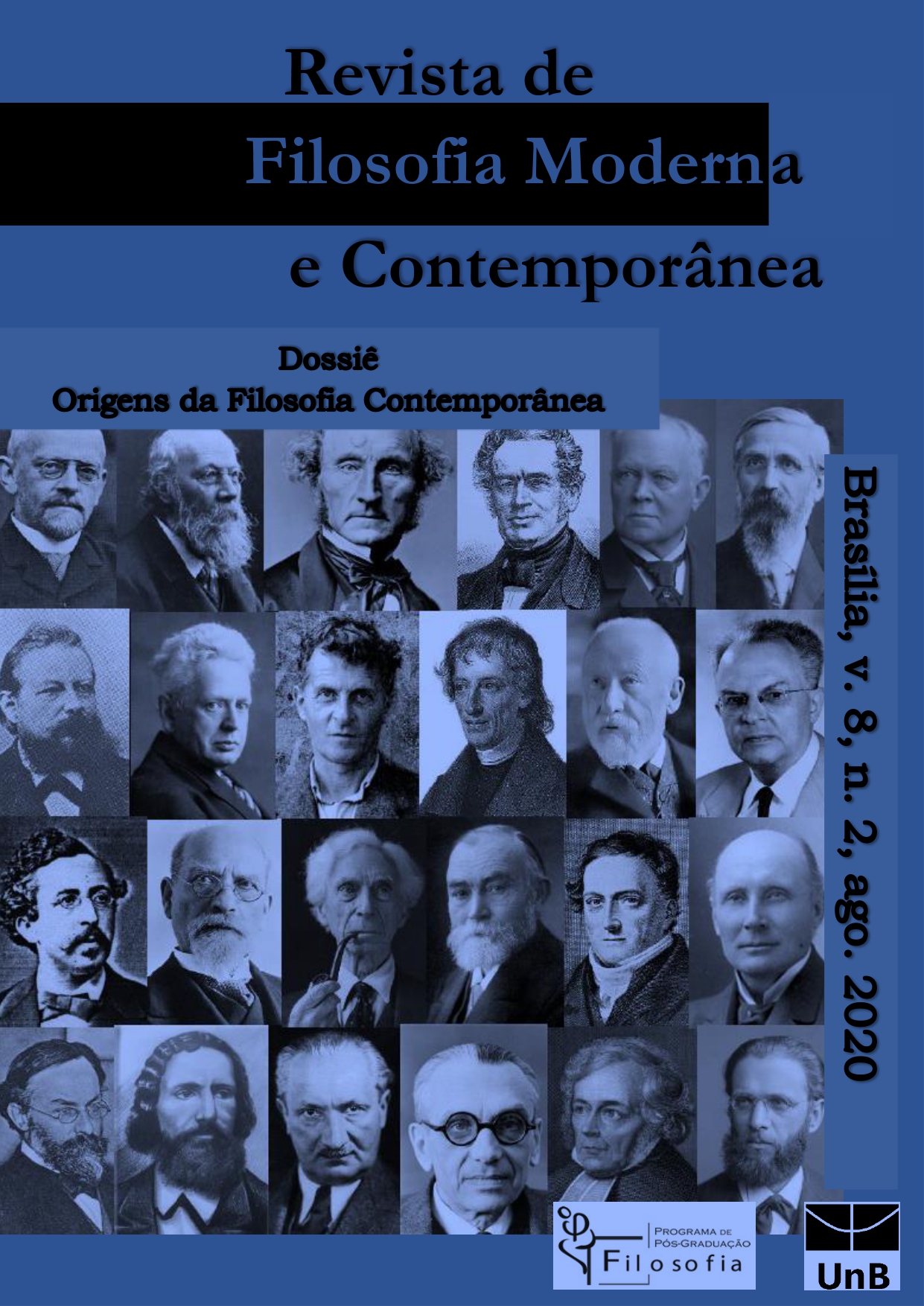Rupture, Fold and Amendment of the Self
An Outline for a Theory of Subjectivity
DOI:
https://doi.org/10.26512/rfmc.v8i2.29074Keywords:
subjectivity, Kierkegaard, fold, amendment, emptinessAbstract
The impulse that directs the self towards the objectivity of knowledge is the same as that which turns on itself within subjectivity. The purpose of this paper is to show that this movement undertaken by the individual, that is, the unfolding of the self on itself (the fold), is succeeded by the free activity of thought in which the self recovers (amends) what was lost in the speculative search. Thus, such recovery is presented through legitimate manifestations of subjectivity (doubt and despair), which can be conceived as the negativity that constitutes human existence. To this end, it is a matter of confronting the philosophy of the Danish Kierkegaard, of a non-systematic character, with other systematic conceptions of the real present in the history of philosophy, such as those of Leibniz’s and German idealism, in order to obtain an outline to think about the self as an opening of subjectivity in the face of the task of human existence.
Downloads
References
ARISTÓTELES. De Anima. Tradução: Maria Cecília Gomes dos Reis. São Paulo, 2007.
BUTLER, Judith. La desesperacíon especulativa de Søren Kierkegaard. Tradução: Leandro Sánchez. Medelín: Ennegativo, 2018.
CIORAN, Emil. Nos cumes do desespero. Tradução: Fernando Kablin. São Paulo: Hedra, 2012.
DELEUZE, Gilles. A Dobra. Leibniz e o Barroco. Tradução: Luiz Orlandi. Campinas: Papirus Editora, 2013.
_____. Diferença e Repetição. Tradução: Luiz Orlandi e Roberto Machado. Rio de Janeiro, São Paulo: Paz & Terra, 2018.
FICHTE, Johann Gottlieb. Os Pensadores. Tradução: Rubens Rodrigues Torres Filho. São Paulo Abril Cultural, 1984.
_____. O destino do erudito. Tradução: Ricardo Barbosa. São Paulo: Hedra, 2014.
GROSOS, Philippe. Système et Subjectivité: étude sur la signification et l’enjeu du concept de système: Fichte, Schelling, Hegel. Paris: Librairie Philosophique J. Vrin, 1996.
GUATTARI, Félix. Caosmose.Tradução: Ana Lúcia de Oliveira e Lúcia Cláudia Leão. São Paulo: Editora 34, 2006.
HEGEL, Georg Wilhelm Friedrich. Enciclopédia das Ciências Filosóficas em Compêndio (1830). Tradução: José Machado e Paulo Meneses. São Paulo: Edições Loyola, 2005.
_____. Diferença entre os sistemas filosóficos de Fichte e Schelling. Tradução: Carlos Morujão. Lisboa: Imprensa Nacional-Casa da Moeda, 2003.
KANT, Immanuel. Os progressos da Metafísica. Tradução: Artur Morão. Lisboa: Edições 70, 1995.
KIERKEGAARD, Søren. Lettres des fiançailles. Tradução: Marguerite Grimault. Paris: Falaize, 1956.
_____. Os pensadores. Tradução: Adolfo Casais Monteiro. São Paulo: Abril Cultural, 1979.
_____. Johannes Climacus ou É preciso duvidar de tudo. Tradução: Sílvia Saviano Sampaio e Álvaro Valls. São Paulo: Martins Fontes, 2003.
_____. O conceito de ironia: constantemente referido à Sócrates. Tradução: Álvaro Luiz Montenegro Valls. Bragança Paulista: Editora Universitária São Francisco, 2006.
_____. Journaux et Cahiers de notes. Vol. I. Tradução: Else-Marie Jacquet-Tisseau. Paris: Éditions L’Orante; Éditions Fayard, 2007.
_____. O Conceito de Angústia. Tradução: Álvaro Luiz Montenegro Valls. Rio de Janeiro: Vozes, 2010.
_____. La época presente. Tradução: Manfred Swensson. Madrid: Trotta, 2012.
_____. Ou-Ou. Um fragmento de vida - Primeira parte. 1ª ed. Tradução: Elisabete M. de Sousa. Lisboa: Relógio D’Água Editores, 2013a.
_____. Pós-escrito à s Migalhas Filosóficas.Vol.I. Tradução: Álvaro Luiz Montenegro Valls e Marília Murta de Almeida. Rio de Janeiro: Vozes, 2013b.
_____. Apuntes sobre la Filosofía de la Revelacíon de F. W. J. Schelling (1841-1842). Tradução: Óscar Parcero Oubiña. Madrid: Trotta, 2014.
_____. Pós-escrito à s Migalhas Filosóficas.Vol.II. Tradução: Álvaro Luiz Montenegro Valls e Marília Murta de Almeida. Rio de Janeiro: Vozes, 2016.
LEIBNIZ, Gottfried Wilhelm. A Monadologia e outros textos. Fernando Luiz Barreto Gallas e Souza. São Paulo: Hedra, 2009.
HERBERT, Marcuse. O homem unidimensional. Tradução: Miguel Serras Pereira. Lisboa: Letra Livre, 2011.
RIMBAUD, Arthur. Prosa Poética. Tradução: Ivo Barroso. São Paulo: Topbooks, 1998.
SCHELLING, Friedrich Wilhelm Joseph. A essência da liberdade Humana. Tradução: Mária C. de Sá Cavalcante. Petrópolis: Vozes, 1991.
_____. Filosofía de la Revelación. Tradução: Juan Cruz Cruz. Pamplona: Cuaderno de anuário Filosófico, 1998.
STEWART. J. The Cambridge Companion to Kierkegaard. Cambridge: Wiley Blackwell, 2015.
_____. Søren Kierkegaard: subjetividade, ironia e a crise da modernidade. Tradução: Humberto Araújo Quaglio de Souza. Petrópolis: Editora Vozes, 2017.
THEUNISSEN, Michael. Anteproyectos de modernidad: antiga melancolía y acedia de la Edad Media. Tradução: Antonio de la Cruz Valles y Naomi Kubota. Valencia: Náyade, 2005.
VALLS, Álvaro Luiz Montenegro. Do desespero silencioso ao elogio do amor desinteressado. Tradução: Álvaro L. M. Valls. Porto Alegre: Escritos, 2004.
_____. Kierkegaard, Préludes Brésiliens. Paris: L’Harmattan, 2018.
VERGOTE, Henri-Bernard. Sens et Répétition. Paris: Cerf/Orante, 1982. (2 v.).
WATKIN, Julia. Kierkegaard view of death in: History European Ideas, Vol. 12, Nº 1, pp. 65-78, 1990.
ŽIŽEK, Slavoj. El resto indivisible. Tradução: Ana Bello. Buenos Aires: EGodot Argentina, 2013.
Downloads
Published
How to Cite
Issue
Section
License
Copyright (c) 2020 Journal of Modern and Contemporary Philosophy

This work is licensed under a Creative Commons Attribution-NonCommercial-NoDerivatives 4.0 International License.
Copyright for articles published in this journal is retained by the authors, with first publication rights granted to the journal. By virtue of their appearance in this open access journal, articles are free to use, with proper attribution, in educational and other non-commercial settings.


